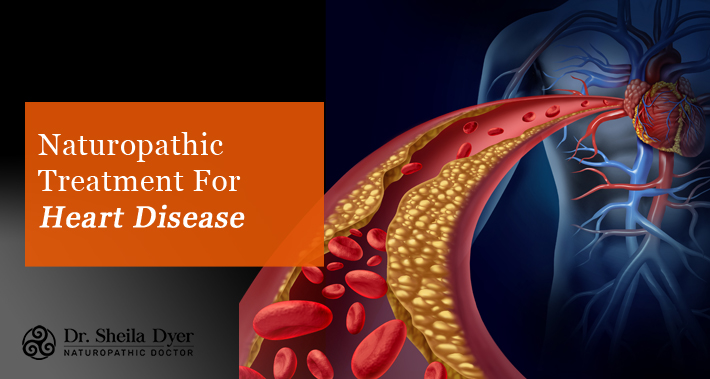Heart disease is the second leading cause of death for Canadians.
Your heart works hard every day to ensure blood, oxygen, and other nutrients get out to the rest of your body, so if it stops working there is an impact on every other part of your body.
I’m Dr. Sheila Dyer, ND, a naturopathic doctor in Toronto and I want to help you learn to recognize the signs of heart disease.
More importantly, let’s talk about ways you can address heart disease and keep your heart healthy.
Keep reading to learn more.
What Is Heart Disease?
Heart disease constitutes any condition which has an impact on the heart structure or the way the heart functions.
It encompasses a variety of different diseases with a number of different causes, all of which have one thing in common – an adverse impact on the heart muscle.
Types Of Heart Disease
There are a variety of conditions which can result in heart disease.
Each one has its own unique set of causes and symptoms.
In this section we will take a closer look at some of the underlying causes, and the symptoms associated with each one.
Atherosclerosis
Atherosclerosis is a narrowing of the arteries.
This results in reduced blood flow, through the body and a lack of blood to extremities.
Symptoms
Symptoms of this lack of blood flow include:
- Weakness of arms and legs
- Chronic pain
- Numbness
- Cold limbs
Causes
Atherosclerosis is caused by a build up of plaque and fats in the arteries.
In addition to increased levels of fat and cholesterol, this build up can be caused by smoking and high blood pressure.
If pieces of this plaque break off, it can lead to life threatening blood clots.
Coronary Artery Disease
Coronary artery disease occurs when a build up of plaque in the heart results in lack of blood flow to the heart.
Another name for this is ischemic heart disease.
Symptoms
An individual with coronary artery disease may experience the following symptoms:
- Nausea
- Digestive disorders
- Chest pain
- Shortness of breath
Causes
The cause for coronary artery disease is similar to those of atherosclerosis, as they both involve build up of plaque in the arteries.
Congenital Heart Defects
Congenital disorders are issues which are present from birth.
Some examples of congenital heart defects include aortic stenosis, Ebstein anomaly, and coarctation of the aorta.
In some causes a heart defect will not cause symptoms or complications.
Symptoms
In cases where a congenital heart defect results in symptoms, these may include:
- Irregular heart rhythm
- Chronic fatigue
- Trouble breathing
- Swelling
Causes
Congenital heart defects form while an infant is still developing inside the womb.
In addition, the structure of the heart can change as a person ages, and defects may develop later in life.
Heart Infections
Specific infections may include inflammation of the heart’s inner lining, the endocardium (or endocarditis) or inflammation of the heart muscle itself (myocarditis).
Symptoms
Symptoms of heart infections are similar to those of other infections, and include:
- Skin conditions like rash
- Chills
- Fever
- Chest pain
- Coughing
Causes
Infections of the heart are caused by the same factors which cause infections in other areas of the body: viruses, bacteria, and parasites.
Arrhythmia
Arrhythmias are irregularities in the rhythm of the heart.
Symptoms
Someone experiencing an arrhythmia may experience the following symptoms:
- Chest pain
- Feeling dizzy, and fainting spells
- Bradycardia (slow heart rate) or tachycardia (fast pulse)
- Lightheadedness
- Fluttering heartbeat
Causes
Arrhythmia is often a side effect of another disease or disorder, and could result from:
- Anxiety and stress
- Diabetes
- Coronary artery disease
- Heart defects
- Hypertension
- Alcoholism
- Excessive use of drugs
Other Types Of Heart Disease
Other forms of heart disease include:
- Cardiomyopathy (weakened heart muscle)
- Structural heart disease (abnormalities in the structure of the heart)
- Heart failure
A Naturopathic Approach To Heart Disease
The naturopathic approach to heart disease focuses largely on prevention, through lifestyle & nutritional counselling services.
Your naturopathic doctor will look at your risk factors, lifestyle, activity level, and may order lab tests to get a better idea of what is going on inside your body.
They will then work with you to create a plan to help provide treatment for any issues you are experiencing, and help prevent further damage.
Let’s have a look at some of the key components to what this may entail.
1. Encouraging A Healthier Lifestyle
A sedentary lifestyle is linked to a number of health issues, including obesity, diabetes, depression, and of course, heart disease.
However for individuals who never exercise, it may seem a daunting task to add it to your daily routine.
Thankfully, no one is asking you to spend hours daily at the gym – your naturopathic doctor will work with you to find ways to incorporate physical activity into your life in a way which works best for you.
The good news is that studies have shown as little as 30 minutes of moderate exercise a day can significantly reduce your risk.
That same review notes that even a little bit of exercise is better than nothing.
So try parking just a little bit further away or taking the stairs instead of the elevator if you can – your heart will thank you.
2. Addressing Digestive Issues
You may be wondering “what does my digestive health have to do with my heart?” but the answer is a lot, actually.
Gut inflammation can result in an imbalance in your microbiome, resulting in inflammation and leaky gut – which can in turn add to your risk for heart disease.
Addressing gut issues can help get to the underlying cause of heart disease.
Digestive health naturopaths often focus on these issues if you’re struggling with heart health.
3. Addressing Endothelial Health
The inner lining of blood vessels is called the endothelium.
Issues with the endothelium can be caused by high blood pressure, inactivity, poor diet, and other factors and can lead to heightened risk of arterial inflammation.
Because this is one of the largest organs in your body, it’s important to keep it healthy.
Book Your Appointment With Dr. Sheila Dyer, ND, Today
Are you worried about your heart health?
Maybe you have other conditions which put you at a higher risk for developing heart disease.
Or perhaps it runs in your family.
I’m Dr. Sheila Dyer, a naturopathic doctor in Toronto, and I want to help.
I will work with you to assess your risks and offer solutions to help keep your heart in great shape.
Contact me today for more information or to set up an appointment.
If you have questions about naturopathic medicine, or would like to start with your first consultation, contact me, and let’s book an appointment.
Dr. Sheila Dyer, ND1080 Dovercourt Rd,
Toronto, ON M6H 2X8
(416) 554-5135
► https://g.page/DrSheilaDyerNd
Dr. Sheila Dyer is a Naturopathic Doctor and a practicing registered nurse offering holistic healthcare with a scientific focus

